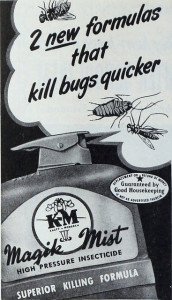How Long Will an Insecticide Application Last?
By Chris Williams on August 6, 2015.
When an exterminator applies insecticide in my home, how long does it last? Do I need to have it repeated every month, or every 6 months, or what?
E. G., North Andover, MA

That’s a tough question because the answer depends on so many variables, from the type of surface where the insecticide is applied to the level of humidity in the room. In the pest control industry, we refer to the active insecticide that is left after an application as the “residual.” Some insecticide products are designed to have a long residual life to continue killing pests over weeks or months, while other products are applied to give quick, but short-term, relief with very little residual. For example, if the insecticide used is a total release aerosol fogger, there is virtually no residual left after the initial application.
Some Surfaces Absorb Insecticides; Others Don’t
Nonporous surfaces like glass, glazed tile, or stainless steel don’t soak up insecticide so more remains on the surface where pests can come into contact with it. The downside is that pesticide that remains exposed on a surface is susceptible to evaporation and removal by cleaning or wear. If there’s dust , oil, or grease on the application surface, that will cut down on the effectiveness of the insecticide as well.
On the other hand, porous surfaces, such as bare wood, concrete, or carpeting, can be expected to soak up a certain amount of the insecticide application. This leaves less for insects that travel on the surface, but more insecticide will be held inside the material to kill wood borers, termites, flea larvae, or other such pests living within.
Conditions Found Inside Affect the Life of an Insecticide
Besides the type of surface, the longevity of an insecticide application is also affected by temperature, light, air movement, and moisture. In general, insecticides applied in a hot environment, such as near furnaces or in some kitchens, will break down more quickly. Bright sunlight and high intensity ultraviolet light also speed up the breakdown of many insecticides. The residual life of an indoor insecticide is further affected by moisture in the form of evaporation, condensation, or high humidity. Cleaning procedures will wash insecticides off of surfaces. In a site with both high heat and high humidity, an insecticide application may not last long at all.
A professional exterminator should be choosing an insecticide based on conditions at the treatment site. There are products that work better in high heat and moisture. Some insecticide products stay on the surface better, while others absorb more easily. Don’t be afraid to ask your pest control professional how long that application can be expected to last. The technician should be rescheduling you for a follow-up visit based on the life expectancy of the application, and the level of pests present.
Photo credit: Internet Archive Book Images / Foter / No known copyright restrictions